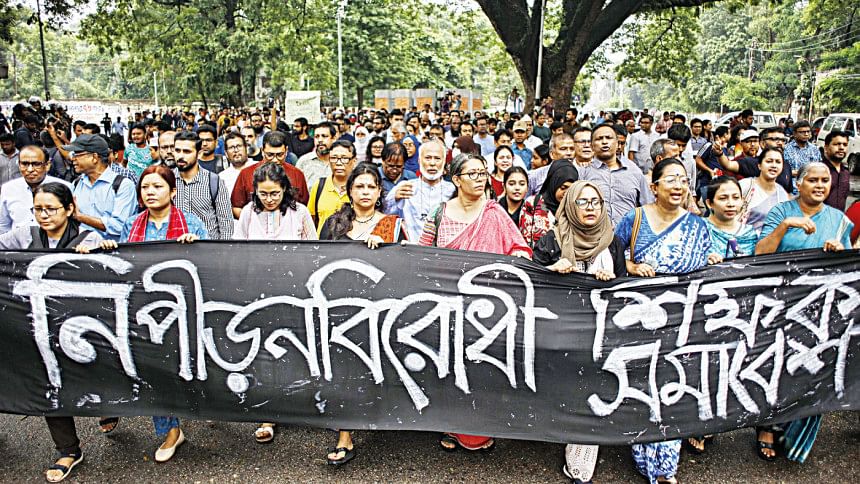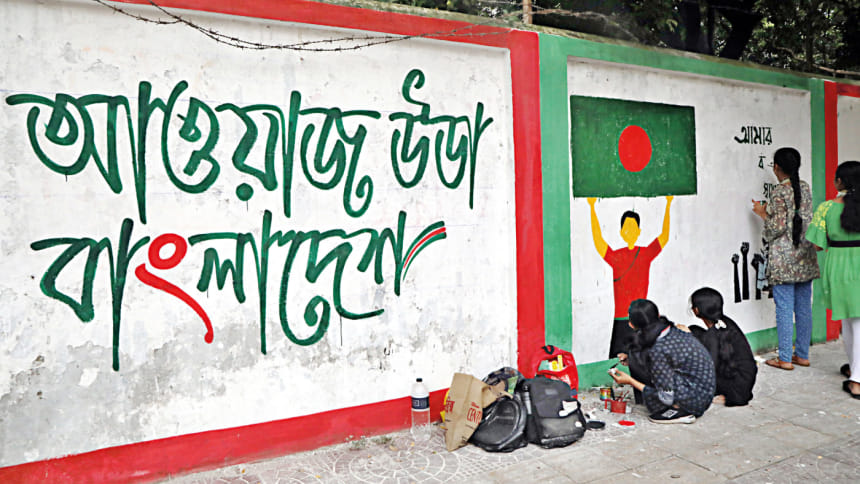The Specter of Silence: Intellectualism and the Performance of Discourse in Bangladesh

In the waning days of 1971, the Pakistani army and their collaborators embarked on a chilling campaign to systematically eliminate the nation's brightest minds – academics, doctors, journalists, artists – those who had dared to dream of an independent Bangladesh and articulate its promise. Their brutal killing was a calculated attempt to cripple the nascent nation, to extinguish the flame of intellectual curiosity and critical thought that fueled the liberation struggle. These were the individuals who had helped shape the idea of Bangladesh as a sovereign nation, who fought the battle of ideas in support of national self-determination. Their absence serves as a reminder of the cost of intellectual courage, casting a long shadow over the pursuit of knowledge and truth in the contemporary period. The ghosts of those silenced voices whisper a warning: intellectual freedom is a fragile thing, easily extinguished by those who fear the power of ideas. The work of freedom, then, is a site of constant struggle.
While Bangladesh boasts a vibrant intellectual scene today, it is often characterized by self-proclamation rather than rigorous scholarship. The prestige associated with the title "intellectual," hard-won through historical struggle and sacrifice, has become a currency in itself. The word carries significant prestige, gravitas, and status, along with the license to (conspiracy) theorize, proselytize, and predict events well into the future because of the historical importance of intellectual work. The game is iterative, updated each time with more conspiracy theories. The winners are those who can proclaim, "I said it first in the year [insert year]," first. The goal is to claim superior knowledge and intellectual prowess based not on analysis but prediction, which gives them legitimacy to "educate" people and shape society, primarily through social media. The manifestation of said intellectualism takes the form of constant bok-bok, in person, on stage, on talk-shows, on social media, in writing, and wherever and whenever there is any silence. The fear of being unheard, of being irrelevant, drives a relentless need to fill every space with noise, often at the expense of genuine intellectual inquiry. In other words, intellectualism has become about erasing silence. Replacing thinking with the drone of monotones has become the work of intellectual performance.

This "bok-bok" phenomenon is partly a reaction to years of suppressed speech under undemocratic rule. The long years of censorship and fear created a pent-up demand for expression, a hunger for open dialogue that is now being satiated with a sometimes-overwhelming torrent of words in the post uprising period. The newfound freedom of expression, while valuable, has created a cacophony of voices, making it difficult to discern meaningful information from the noise. The sheer volume of opinions and pronouncements can be overwhelming, leading to a sense of information overload and a devaluation of genuine expertise.
Furthermore, deeply ingrained hierarchies within intellectual spaces, based on legacy, social connections, and political affiliations, continue to filter and control public discourse. These gatekeepers, often operating within established institutions and media platforms, determine who has the right to speak and be heard, often favoring those who align with popular sentiment or offer entertaining narratives. This creates a self-perpetuating cycle, where established voices are amplified while dissenting or marginalized perspectives struggle to gain traction. This theater is vibrant with excellent performances of allyship, class solidarity, and inclusion; there are multiple such theaters competing for political/social space. Each is exclusionary, however, although together they might produce the veneer of democracy and plurality.
In this environment, intellectual authority is no longer derived solely from rigor or analysis but from a complex interplay of factors, including title, seniority, institutional affiliation, and the ability to generate buzz. Designated speakers dominate intellectual events, while others perform the role of praise singers, creating an illusion of dialogue that masks a one-way flow of information. The pursuit of stardom within academia further exacerbates this trend, fostering conformity and stifling dissent.
This raises critical questions about the definition of an intellectual itself in contemporary Bangladesh. Is it determined by academic credentials, social media following, political influence, or some combination of these factors? The past glory of university professors who embodied a centralized form of intellectualism rooted in deep scholarship and social commitment, stands in stark contrast to the fragmented and often partisan landscape of today. Their legacy serves as a reminder that true intellectualism requires both intellectual prowess and a commitment to truth, justice, and the betterment of society.
This is not to deny the presence of committed academics and intellectuals who actively challenge injustice. During the July uprising and other political movements, many university professors took to the streets, transcending party affiliations and ideological biases to oppose oppression and state repression. However, intellectualism encompasses more than public demonstrations of solidarity. It demands rigorous research, critical thinking, and a commitment to fostering these qualities in students. As educators, we have a responsibility to insist that critical thinking and engagement be central to intellectual discourse, that the battle of ideas rely on rigor and logic, not just star power and viral fame.
During the July Uprising, a speech I gave at a University Teachers Network event went viral. While I appreciate the attention it garnered, I believe my academic work, my recent book on Bengali Muslims in particular, offers a more substantial contribution to the intellectual landscape in South Asia. Standing up for our students and opposing their unjust killing should be a normal, commonsensical act, not a marker of exceptional intellectualism. The tendency to equate viral moments of public dissent with intellectual authority is problematic. True intellectual engagement requires deeper analysis and a willingness to grapple with complex ideas, not just catchy slogans or emotional appeals. The pursuit of knowledge should be driven by a genuine desire for understanding, not the pursuit of fleeting fame. The "thinning" of the word "intellectual" risks diluting the value of critical thinking and expertise, reducing intellectualism to a mere performance rather than a genuine pursuit of understanding.
Moving forward, Bangladesh must foster an intellectual climate that values genuine dialogue, critical engagement, and diversity of thought. We must resist the allure of "star intellectualism" and reclaim the legacy of the pursuit of knowledge as a means of liberation, not self-promotion. We must create spaces where diverse voices can be heard, where dissent is valued, and where the pursuit of truth is not constrained by the demands of popularity or political expediency. Only then can Bangladesh truly honor the sacrifice of its martyrs and fulfill its potential as a nation where knowledge empowers and liberates people.
Navine Murshid is an Associate Professor of Political Science at Colgate University. She is the author of India's Bangladesh Problem: The Marginalization of Bengali Muslims in Neoliberal Times (Cambridge University Press, 2023). She is currently a Professor at North South University.

 For all latest news, follow The Daily Star's Google News channel.
For all latest news, follow The Daily Star's Google News channel. 



Comments